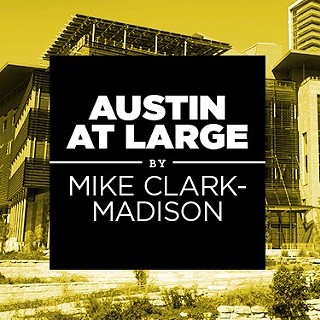Austin At Large: What Are Y'all Afraid Of?
Framing the gains and losses on all sides of Austin's battles over land use
By Mike Clark-Madison, Fri., Feb. 7, 2020
When you study communications, you learn quickly about framing effects and how loss framing is more potent than gain framing. A classic example – it's even illustrated on the Wikipedia page for "framing effect" – is a patient consent form for surgery. If you say there are complications in 10% of cases, people are quite reluctant to sign; if you say there are no such problems 90% of the time, that reluctance dissipates. Y'all get it, I'm sure.
I thought of this when I saw our friend Audrey McGlinchy over at KUT quote on Twitter one of the city's Land Development Code consultants about the ongoing rewrite: "Most of the city, we don't think anything would really change significantly." This is empirically true, even with the theoretical additions to development capacity in the LDC's new base zoning districts; those changes don't directly force property owners to do anything, and most will not. I'm sure y'all get that, too.
But does the consultant's quote represent loss framing or gain framing? He meant it perhaps to manage expectations and perhaps as reassurance, but of course not everyone took it that way. For urbanist voices who are already disheartened by what they see as backsliding on the Council majority's commitment to abundant and affordable housing everywhere in Austin, it's a loss to say their efforts aren't going to make that much of a difference, even if we all get the rational basis behind the assessment. And for many of the people in areas that will change – that are already changing – the fact that others have no cause to worry is cold comfort.
What Stake Do You Hold?
We may call those worried people "NIMBYs," and in practice NIMBYism is all about loss framing. The stakes held by "stakeholders" in a developer-vs.-neighborhood battle are often quite asymmetrical when rendered in black and white. On one side, you have a lot of money being spent before any is made, and a lot of people's hard work and professional skill and reputations that are placed at risk; on the other is, most of the time, a series of potential but not inevitable harms. Some of those are grave enough to snap people to attention – threats to people's safety or irreplaceable historic or environmental resources.
Others are threats to "neighborhood character" and whatnot that are easy to discount or mock, but they are still threats, which means they are more potent than the countervailing urbanist messages about choices and opportunities. This would be true regardless of how people feel about change in the abstract, or what socioeconomic capital or privilege they each possess or enjoy, or what stories brought them to the battle being waged.
It can be more true based on those factors, which is why in its latest LDC draft, City Hall is dialing back the redevelopment capacity of neighborhoods more at risk of "gentrification," which equates to loss, than elsewhere. In some of those same neighborhoods, including where I live in Central East Austin, that capacity has been dialed up in prior decades in the interest of "revitalization," which equates to gain. Those plans, such as for East 11th and 12th streets, were, as they say, overtaken by events.
Where Will You Call Home?
Much has been said in the LDC debate about "speculation" in East and Central Austin that a higher-capacity code could unleash. When it's not being used simply as a euphemism, that term also now equates to loss, even though many longtime East and Central property owners, again including myself, have benefited or will do so from the escalating value of our homes. Just as steady central city employment near the median income kept Austin's urban core – even on the Eastside, even in the past – from collapsing, the homes those jobs paid for are now pension plans.
"Speculation" used to describe shaky and shady real estate deals, propped up by grifts of varying legality, to build where there was no real demand, even in an Austin that was booming then as it is now. The creation of those places instead of sustainable places within urban Austin – aided by perverse incentives within the LDC we're now replacing – forced generations of Austinites into false choices that likewise equate to loss: all of the toxic and unjust absurdities of the sprawl-driven life, from road rage to climate change to substandard wages.
As urbanism has become political and mapped onto other political forces and movements, its gain framing of choices and opportunities – of people-centered placemaking as a fun and exciting antidote to boring, ugly auto sprawl – is being replaced by loss framing of threats and outrages. The new LDC is not utopian; it would legalize and rationalize changes that are already happening in many submarkets (defined by location, housing type, and/or price point) within Austin. Those opposed to a new code do not fear a bunch of condos being built and then sitting empty; they're afraid of them being full of newer, richer Austinites who'll wipe old ones off the map.
But urbanists now have the same fears – that without more new housing all over town, they'll be the ones forced to leave. The process, if you can call it that, for deciding who gets to stay in Austin's housing market as it evolves, within whatever the new LDC allows, may or may not be "just," depending on your values. But it will have winners and losers among people on all sides of the current conflict.
Got something to say? The Chronicle welcomes opinion pieces on any topic from the community. Submit yours now at austinchronicle.com/opinion.









